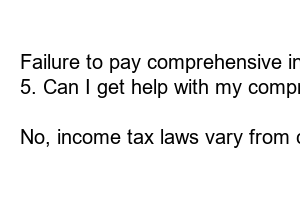종합소득세 대상자
Subject to Comprehensive Income Tax: Understanding the Basics
Are you familiar with the term “subject to comprehensive income tax”? Whether you are an individual or a business owner, it’s important to have a clear understanding of how income tax works and how it affects you or your business. In this blog post, we will dive into the basics of comprehensive income tax, its implications, and what you need to know to stay compliant with the law.
1. What is Comprehensive Income Tax?
Comprehensive income tax is a tax imposed on all sources of income that a person or entity earns within a given tax year. This includes income from employment, self-employment, investments, and any other sources that generate income. It is an all-encompassing tax that aims to capture all types of income, ensuring that individuals and businesses pay their fair share.
2. How Does Comprehensive Income Tax Work?
When it comes to individuals, comprehensive income tax is calculated based on their taxable income. Taxable income is determined by deducting allowable deductions and exemptions from the total income earned. The remaining amount, known as the taxable income, is then subject to specific income tax rates set by the government.
For businesses, comprehensive income tax works slightly differently. Corporations, for instance, are subject to income tax based on their net taxable income, which is calculated by deducting allowable business expenses from their gross income. Different tax rates may apply, depending on the type of business and its size.
3. Why is Comprehensive Income Tax Important?
Comprehensive income tax is a crucial component of a country’s revenue system. It helps fund various government programs, infrastructure development, public services, and more. By paying income tax, individuals and businesses contribute their fair share to the overall well-being and development of their country.
4. What are the Implications of Comprehensive Income Tax?
Comprehensive income tax has several implications for individuals and businesses alike. For individuals, it’s essential to accurately report and pay your taxes on time to avoid fines, penalties, and legal consequences. Failure to comply with income tax regulations can result in audits, investigations, and potential criminal charges.
For businesses, comprehensive income tax can impact their profitability and cash flow. Understanding the tax laws, taking advantage of deductions, and seeking professional advice can help businesses navigate the complexities of income tax and optimize their tax liabilities.
5. How Can I Stay Compliant with Comprehensive Income Tax Laws?
To stay compliant with comprehensive income tax laws, it’s crucial to keep accurate records of your income and expenses, maintain proper documentation, and file your tax returns on time. Seek professional guidance from tax experts or accountants to ensure you take advantage of all available deductions and exemptions while staying within the boundaries of the law.
6. What are the Benefits of Comprehensive Income Tax?
Comprehensive income tax, when implemented effectively, can contribute to a fair tax system where everyone pays their fair share. It ensures that individuals and businesses with higher incomes contribute more, helping create a balanced and sustainable economy. It also helps fund essential public services and social welfare programs that benefit society as a whole.
In summary, comprehensive income tax is a vital aspect of a country’s revenue system. By understanding how it works and staying compliant with the law, individuals and businesses can contribute their fair share while avoiding potential legal consequences. Seek professional advice for personalized guidance and take advantage of the benefits that comprehensive income tax offers for the overall development and well-being of your country.
—
FAQs:
1. Are there any exemptions to comprehensive income tax?
Yes, there are specific exemptions and deductions available for individuals and businesses, which help reduce their taxable income. Consult with a tax professional to understand if you qualify for any exemptions.
2. How often do I need to pay comprehensive income tax?
Individuals typically pay income tax yearly when filing their tax returns. However, businesses may have different payment schedules depending on their entity type and local regulations. It’s best to consult with a tax expert to determine your specific payment obligations.
3. Can I deduct business expenses from my comprehensive income tax?
Yes, businesses can deduct allowable business expenses from their gross income to arrive at their net taxable income. These deductions help reduce the overall tax liability.
4. What happens if I fail to pay comprehensive income tax?
Failure to pay comprehensive income tax can result in fines, penalties, and potential legal consequences, such as audits or investigations. It’s crucial to meet your tax obligations to avoid these negative outcomes.
5. Can I get help with my comprehensive income tax filings?
Yes, seeking professional help from tax experts or accountants can provide valuable guidance and ensure that your tax filings are accurate and compliant with the law.
6. Is comprehensive income tax the same in every country?
No, income tax laws vary from country to country. Each country has its own tax regulations, rates, and exemptions. It’s essential to understand the specific income tax laws in your country of residence or business operation.

